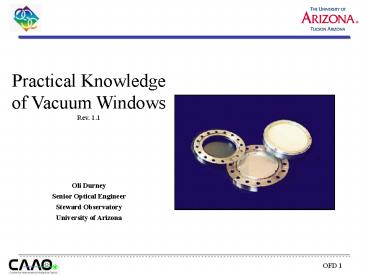OFD 1 - PowerPoint PPT Presentation
1 / 24
Title:
OFD 1
Description:
Oli Durney. Senior Optical Engineer. Steward Observatory. University of Arizona ... Deflection causes plano window to have power, thus creating a meniscus lens ... – PowerPoint PPT presentation
Number of Views:195
Avg rating:3.0/5.0
Title: OFD 1
1
Practical Knowledge of Vacuum Windows Rev. 1.1
Oli Durney Senior Optical Engineer Steward
Observatory University of Arizona
2
Typical Geometry
Ambient Space
Mounting Bolt
Window Flange
O-ring Seal
Window
Cryostat Case
Cryostat Case
Vacuum Space
3
Example O-ring Seal
4
Example Indium Seal
5
Window Support
Case 1 Simply Supported
Pressure
Lateral translation
k 1.24
k1 0.696
Case 2 Rigidly Fixed
Pressure
k 0.75
No Lateral translation
k1 1.71
6
O-ring Groove
Window
Force
Light coating of Apiezon vacuum grease L or M
20
0.139
Cryostat Case
Cryostat Case
O-ring (2-240)
0.105
Compressed O-ring
0.150
7
Strength of Material
- Rule of Thumb Safety Factor 10
- Use reference book to get strength of material
in PSI - Normally the Modulus of Rupture (MOR) is used
- Safety Factor is
Strength
S.F.
Stress
Solve for Stress
8
Maximum Stress
- Outside Pressure Atm 760 Torr 14.7 PSI
- Inside Pressure 10E-6 Torr 0 PSI
- Stress of the Window
w R2
Sm
k
t2
k coefficient k for circular plates w uniform
pressure across window (outside P inside P) R
radius of Clear Aperture of window t thickness
of window
Solve for t
9
Maximum Defection
- Window bowing can affect optical design
- Deflection causes plano window to have power,
thus creating a meniscus lens - Optical design will govern amount of deflection
(sag) allowable - If window is Simply Supported and O-ring does not
compress fully
k1 coefficient k1 for circular plates w
uniform pressure across window (outside P
inside P) R radius of Clear Aperture of
window E Youngs modulus t thickness of window
Solve for t
10
Rules of Thumb
- Typical k value for stress calculation used in
practice is 1.00 - Reasonable (and typical) material choice for NIR
waveband is Fused Silica or BK7 - Fused Silica Youngs modulus 1.06E07 PSI
- Modulus of Rupture
7600 PSI - BK7 Youngs modulus 1.19E07 PSI
- Modulus of Rupture 2400 PSI
- k1 for deflection calculations vary from 0.696 to
0.171 depending on whether window is constrained
by Case 1 or 2 - Typically use 0.43
- O-ring types
- Buna-N has highest permeation and retains water
- Viton has lowest permeation and minimal water
retention
11
Real World Example
12
LBTI UBC
Vacuum windows
Gate valve windows
13
Window Specs
- Lower Gate Valve Window
- Material BK7 or Fused Silica
- Diameter 101.8mm 0.00 / -0.25mm
- Thickness 6.35mm /- 0.25mm
- Wavefront 1/4 wave across CA
- Clear Aperture gt 80 diameter
- Parallelism lt 1 arcmin
- Surface Quality 20-10
- Upper Gate Valve Windows
- Material BK7 or Fused Silica
- Diameter 137.5mm 0.00 / -0.10mm
- Thickness 8.0mm /- 0.10mm
- Wavefront 1/4 wave across CA
- Clear Aperture gt 85 diameter
- Parallelism lt 30 arcsec
- Surface Quality 40-20
14
Window Detail for Lower
15
Window Detail for Upper
16
Max Stress
- Maximum Stress (Lower Gate Valve Window)
- Maximum Stress (Upper Gate Valve Window)
17
Calculations for BK7
- Safety Factor (Lower Gate Valve Window)
- Safety Factor (Upper Gate Valve Window)
18
Calculations for BK7
- Maximum Deflection (Lower Gate Valve Window)
(14.7PSI)(46.05mm)4
w R4
(0.43)
0.009 mm
ym k1
(1.19E7PSI)(6.35mm)3
E t3
- Maximum Deflection (Upper Gate Valve Window)
(14.7PSI)(65mm)4
w R4
(0.43)
0.019 mm
ym k1
(1.19E7PSI)(8mm)3
E t3
19
Calculations for F.S.
- Safety Factor (Lower Gate Valve Window)
- Safety Factor (Upper Gate Valve Window)
20
Calculations for F.S.
- Maximum Deflection (Lower Gate Valve Window)
(14.7PSI)(46.05mm)4
w R4
(0.43)
0.010 mm
ym k1
(1.06E7PSI)(6.35mm)3
E t3
- Maximum Deflection (Upper Gate Valve Window)
(14.7PSI)(65mm)4
w R4
(0.43)
0.021 mm
ym k1
(1.06E7PSI)(8mm)3
E t3
21
Conclusions
22
Window using O-ring Seal
Figure 2 LN2 Cryostat
Figure 1 O-ring style vacuum window
23
Window using Indium Seal
Figure 3 Indium style vacuum window
Figure 4 Balloon Cryostat
24
Other Examples































